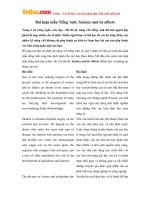Mẫu bài political science opinion essay đạt 10 10
Bạn đang xem bản rút gọn của tài liệu. Xem và tải ngay bản đầy đủ của tài liệu tại đây (51.84 KB, 3 trang )
Pros and cons of Socialism
Socialism, Summary
The age-old debate about the pros and cons of socialism has grown increasingly bitter
as the gap between Republicans and Democrats widens. Before analyzing opposing
arguments, let's review the basics.
Socialism is a political and economic social organization theory. It requires public
ownership and control of the means of production (land, labor, money, and
entrepreneurship). Economic output is then given based on individual contributions.
Socialist ideas are related to other political beliefs, such as communism, anarchism,
and democratic socialism. Socialist ideas emerged during the French Revolution and
became popular as a political movement during the Industrial Revolution, explains the
Encyclopedia Britannica. The Soviet Union became the world's first communist state
in 1921, after the Russian revolution. Although, intellectually, the origins of socialism
go back to ancient Greece.
Today, China, Cuba, Laos, and Vietnam consider themselves communist states.
Although, their mixed economies increasingly incorporate capitalist policies. The
Socialist Party has ruled Venezuelan politics for more than a decade. In addition, some
describe the Nordic countries - including Denmark, Norway, Sweden, Finland and
Iceland - as democratic socialist countries. However, the "Nordic model" is better
defined as a social democracy with a strong welfare state.
Now, let's look at the pros and cons of socialism, starting with the advantages.
Favorable socialism
First, socialism emphasizes cooperation within a group, rather than individualism and
competition for resources. Strong public support for the needs of groups, rather than
individuals, can better help populations weather national crises.
In theory, socialism is free from economic differences. In a socialist society, all
resources are owned by the public, and wealth is created to benefit all. An economic
plan defines how your wealth will be distributed, making it possible for you to do so
fairly. This, in theory, hinders social class distinctions between rich and poor.
Compared to capitalism, socialism can better empower citizens and protect them from
mistreatment. As the Encyclopedia Britannica explains, socialists believe that
capitalism concentrates “wealth and power in the hands of a relative few, the winners
of free-market competition.” . The rich then make decisions that maximize their
“individual freedom” and “equality of opportunity.” This minimizes those who are
working, who have to work for themselves to survive. In contrast, society's control of
group resources - the "base for prosperity" - provides true freedom and equality for
all.
Ultimately, public ownership of limited natural resources can lead to better
conservation and management.
Disadvantages of Socialism
Some forms of socialism - specifically communism - give rise to one-party rule and
supreme leaders. Humanitarian organizations regularly criticize communist countries
for human rights violations against minorities. They also denounce basic democratic
ideals of limited freedom of speech, information and press.
Second, restricting free market forces can slow economic growth. Economists largely
agree that competition in the free market better promotes innovation, productivity,
risk-taking, and ultimately wealth creation. In socialist China, for example, nearly
90% of the country's population lived in extreme poverty throughout the 1980s. By
prioritizing globalization and adopting capitalist policies, the land The country has
lifted more than 800 million people out of poverty in less than 40 years.
Economic planning can also impede economic growth. Without access to supply and
demand indicators, planned socialist economies often produce too much or too little of
certain goods and miss opportunities. They are also more vulnerable to fiscal
mismanagement and miscalculation. For example, shortages and hoarding were
common in the former Soviet Union, notes Encyclopedia Britannica. In addition, poor
fiscal management has contributed to increasing inflation and making the economy
vulnerable to external pressures.
Finally, there is no solid evidence that socialism is free from economic inequality.
The Pros and Cons of Socialism: Both Sides Speak
Between the 2016 and 2020 US presidential elections, debates about the pros and cons
of socialism have been heated. Bernie Sanders, Democratic Socialist
THƠNG TIN LIÊN HỆ:
-------------------------Nếu cịn bất kỳ thắc mắc nào hoặc muốn tìm kiếm thêm nhiều tài liệu ESSAY,
ASSIGNMENT mới mẻ khác của Trung tâm Tri Thức Cộng Đồng,
Liên hệ dịch vụ viết thuê assignment, dịch vụ essay: />Hoặc qua SĐT: 0946 88 33 50 hoặc email: để được giúp đỡ
nhé!









